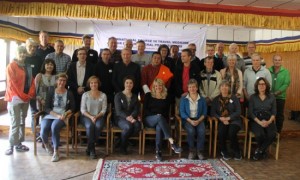 Medicinal tours and travel in Bhutan: Understanding ailment the Bhutanese way.To the travelers from east or tourists from west, Bhutan’s indigenous knowledge provides an intriguing insight to causes of several illnesses in the modern society. Buddhism identifies about 84,000 kinds of bodily illnesses stemming from three base poisons, which are attachment, anger, and ignorance.
Medicinal tours and travel in Bhutan: Understanding ailment the Bhutanese way.To the travelers from east or tourists from west, Bhutan’s indigenous knowledge provides an intriguing insight to causes of several illnesses in the modern society. Buddhism identifies about 84,000 kinds of bodily illnesses stemming from three base poisons, which are attachment, anger, and ignorance.
The defense system of the body is weakened when one is overpowered by any of these destructive mental states. This makes the body susceptible to diseases, according to lopen Gyembo Dorji, dratshang lhentshog’s secretary general.
He said “When one allows oneself to be ruled by these three poisons, both the psychological and physical health hazards are numerous and can be quite devastating”.
Lopen Gyembo Dorji was speaking on Buddhist approach to illness, yesterday to a group of 33 Danish medical doctors, who are in the country to attend the second week long international workshop on travel medicine.
In Buddhism, the body is composed of the four elements – earth, water, fire, wind, he explained. “Each of the four elements is able to cause 21,000 diseases and, as such, we have a total of 84,000 different diseases,” he said.
The earth element, for instance, can cause diseases that make the body heavy, stiff and painful, such as arthritis; the water element can cause diarrhea and stomachaches, such as constipation; and wind can cause breathing difficulties and vomiting. “An imbalance of the four elements results in generation of disorder in our body and mental system,” lopen Gyembo Dorji said.
Organised by the center for research initiatives, health ministry and the LUF, Denmark, the workshop is expected to orient the doctors on Bhutan’s health problems, so that they can advise their people, who travel to Bhutan, about the precautions travellers need to take.
The first travel medicine workshop was held last year for 24 Danish doctors because, given the way people travel today, it has become important for doctors across the globe to be aware of the conditions and diseases of other countries.
Lopen Gyembo Dorji said that Buddhism talks about the four noble truths, with suffering being the first one.
“For instance, when the mind is filled with ceaseless thoughts and emotions, the body experiences change every second, which leads to failure of the brain, due to continual clutter of thoughts and emotions,” he said.
While there are many remedies, the key remedy to this problem is meditation, he said. “Meditation aligns the mind and body; it wakes up the unconscious part of the body and brain and, by doing that, we’re synchronizing the four elements, which has a direct impact on curing,” he said.
The Danish doctors were also given a talk on the mental health situation in the country, where psychiatrist Dr Chencho Dorji said that Bhutan is today seeing an increasing case of anxiety, especially among the young people.
He also shared with the doctors that alcohol dependence syndrome has become a major public health problem. “Alcohol is the number one cause of death in hospital for the last 30 years,” he said.
Talks were also given on the country’s development philosophy of Gross National Happiness, sexually transmitted diseases (STDs) and on the country’s health system and disease patterns.
Coordinator of the Danish doctors’ team, Dr Mett Wamning, said the second workshop was organised following the success of the last workshop. She said people liked it and, while they had 24 participants last year, they had left behind 15 more on the waiting list.
“We wanted to have the opportunity on combining knowledge about third world diseases, and the ways of tackling them, with the opportunity of visiting Bhutan.”
This year also, there are 15 more doctors on the waiting list back in Denmark wanting to participate in the workshop, she said.
“For us, travel medicine is about diseases that we normally don’t have in Denmark and that people bring back,” Dr Mett Wamning said. “For example, STDs, is also a problem in Denmark, but these are diseases that people can bring home when they travel abroad also; so it’s a mixture of diseases that we know back home, but very much about diseases that we don’t see normally.”









